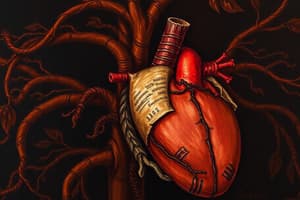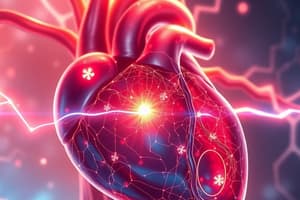Podcast
Questions and Answers
What is the primary site of action for beta 1 selective blockers?
What is the primary site of action for beta 1 selective blockers?
- Lungs
- Blood vessels
- Pancreas
- Heart (correct)
What is the consequence of giving non-selective beta blockers to patients with COPD or asthma?
What is the consequence of giving non-selective beta blockers to patients with COPD or asthma?
- BP increases
- Pancreas releases insulin
- Oxygen consumption decreases
- Risk of exacerbation increases (correct)
What is the effect of metoprolol on the concentration of another drug?
What is the effect of metoprolol on the concentration of another drug?
- It has no effect on the concentration of other drugs
- It increases the concentration of beta-1 adrenergic blockers (correct)
- It increases the concentration of angiotensin II
- It decreases the concentration of beta-1 adrenergic blockers
What is the mechanism of action of beta 1 blockers on the heart?
What is the mechanism of action of beta 1 blockers on the heart?
What is the effect of nebivolol on the body?
What is the effect of nebivolol on the body?
When should metoprolol be administered in relation to meals?
When should metoprolol be administered in relation to meals?
What is the effect of verapamil on insulin?
What is the effect of verapamil on insulin?
What is the mechanism of action of Class III potassium channel blockers?
What is the mechanism of action of Class III potassium channel blockers?
What is a common side effect of potassium channel blockers?
What is a common side effect of potassium channel blockers?
What is the effect of digoxin on potassium channel blockers?
What is the effect of digoxin on potassium channel blockers?
What is the mechanism of action of Class IV non-selective calcium channel blockers?
What is the mechanism of action of Class IV non-selective calcium channel blockers?
What is a common side effect of Class IV non-selective calcium channel blockers?
What is a common side effect of Class IV non-selective calcium channel blockers?
What is the primary mechanism of action of propranolol in the heart?
What is the primary mechanism of action of propranolol in the heart?
What is a major contraindication for the use of non-selective beta blockers?
What is a major contraindication for the use of non-selective beta blockers?
What is the site of metabolism for propranolol?
What is the site of metabolism for propranolol?
What is the effect of propranolol on the sympathetic nervous system?
What is the effect of propranolol on the sympathetic nervous system?
What are the possible adverse reactions to propranolol?
What are the possible adverse reactions to propranolol?
What is the normal conduction pathway in the heart?
What is the normal conduction pathway in the heart?


